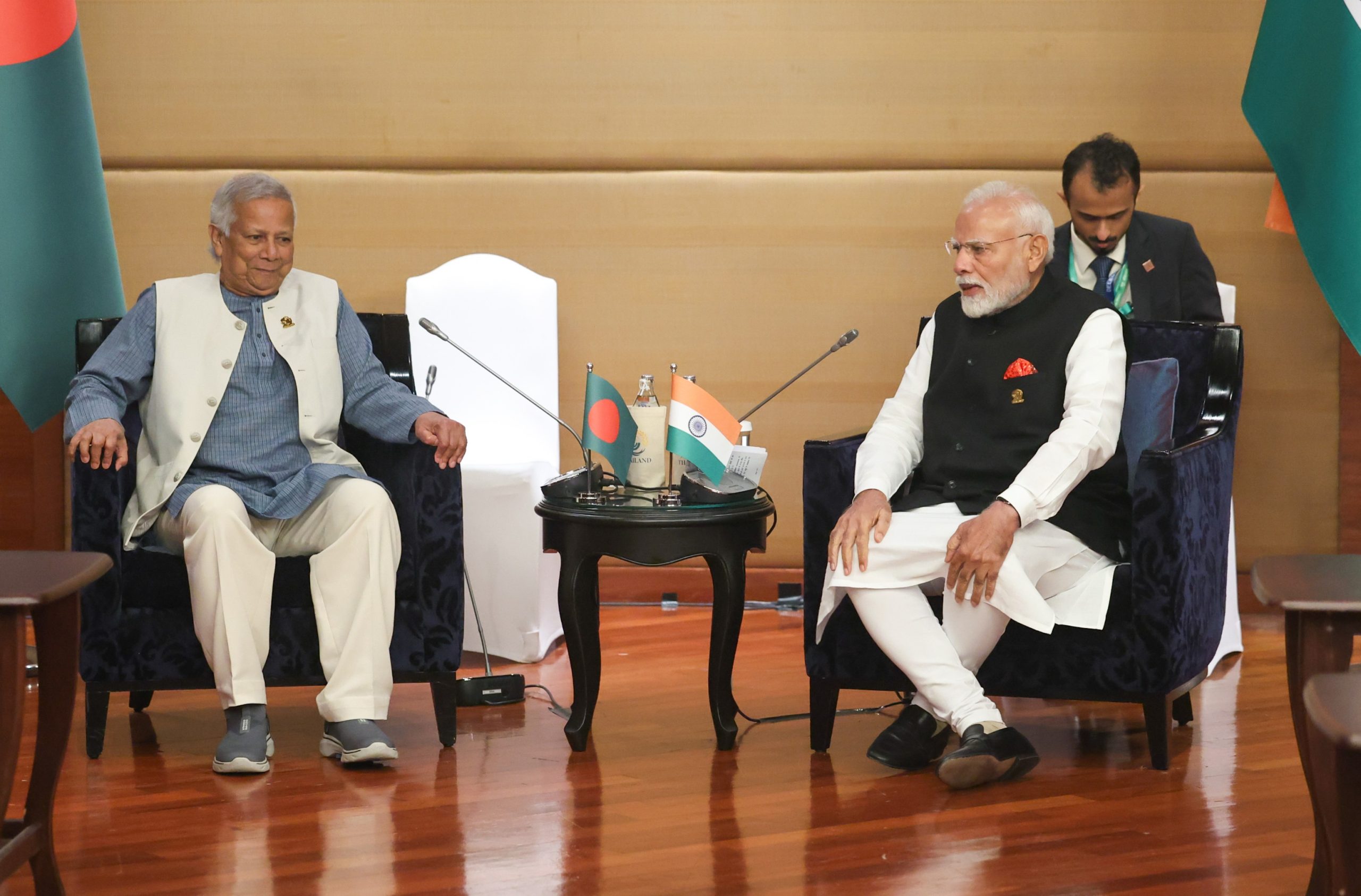Prime Minister Narendra Modi on Friday raised the issue of the safety and security of minorities in Bangladesh, including Hindus, during his meeting with Muhammad Yunus, Chief Advisor of the interim government in Bangladesh. The meeting was held on the sidelines of the BIMSTEC Summit in Bangkok.
This was the first in-person meeting between the two leaders since the ouster of the Awami League government led by former Prime Minister Sheikh Hasina and the formation of the interim government under Yunus’s leadership in the neighbouring country last August.
Prime Minister Modi urged that any rhetoric which vitiates the environment should be avoided. He expressed his conviction that all issues of mutual interest between the two countries would continue to be addressed and resolved bilaterally through constructive discussions, in the interest of the long-standing relationship between the two nations.
“The Prime Minister also underlined India’s concerns related to the safety and security of minorities in Bangladesh, including Hindus, and expressed his expectation that the government of Bangladesh would ensure their protection — including by thoroughly investigating all cases of atrocities committed against them,” said Foreign Secretary Vikram Misri during a media briefing after the BIMSTEC Summit.
During the meeting, PM Modi reiterated India’s support for a democratic, stable, peaceful, progressive, and inclusive Bangladesh. He also emphasized that India believes in a people-centric approach to the bilateral relationship and highlighted the long-standing cooperation between the two countries, which has delivered tangible benefits to the people of both nations.
“In this spirit, he once again underlined to Prof. Yunus India’s desire to forge a positive and constructive relationship with Bangladesh, based on pragmatism. The Prime Minister also urged that any rhetoric which vitiates the environment should be avoided.”
“On the border, strict enforcement of the law and prevention of illegal crossings — especially at night — are necessary for maintaining border security and stability. There are several mechanisms between the two countries, and these could convene as appropriate to review and strengthen our ties,” added Foreign Secretary Misri.
Discussions also covered Dhaka’s request for Hasina’s extradition and the holding of elections in Bangladesh.
As PM Modi expressed his grave concern about attacks on minorities and urged Bangladesh to act responsibly, he also shared his views with Yunus on the importance of holding regular and inclusive elections — a vital component of any democracy and essential for ensuring a stable Bangladesh in the future.
Earlier in the day, Bangladesh assumed the Chair of the Bay of Bengal Initiative for Multi-Sectoral Technical and Economic Cooperation (BIMSTEC).
Founded on June 6, 1997, the regional grouping has expanded from its original four member states — Bangladesh, India, Sri Lanka, and Thailand — to include Myanmar, Bhutan, and Nepal, supporting regional collaboration on a variety of issues, including healthcare.
“The Prime Minister congratulated Bangladesh on assuming the Chair of BIMSTEC and looked forward to the forum advancing regional cooperation under Bangladesh’s leadership. The leaders also exchanged views on other issues and agreed to enhance consultations and cooperation to strengthen regional integration, including under the BIMSTEC framework,” said Misri.
Meanwhile, Chief Advisor’s Press Secretary Shafiqul Alam told Bangladeshi media that Yunus presented a photograph to Prime Minister Modi during their meeting, showing Modi awarding Yunus a gold medal at the 102nd Indian Science Congress held in Mumbai on January 3, 2015.
“All issues of mutual interest were discussed. The meeting was very constructive, productive, and fruitful,” Alam said.
(Inputs from IANS)




















